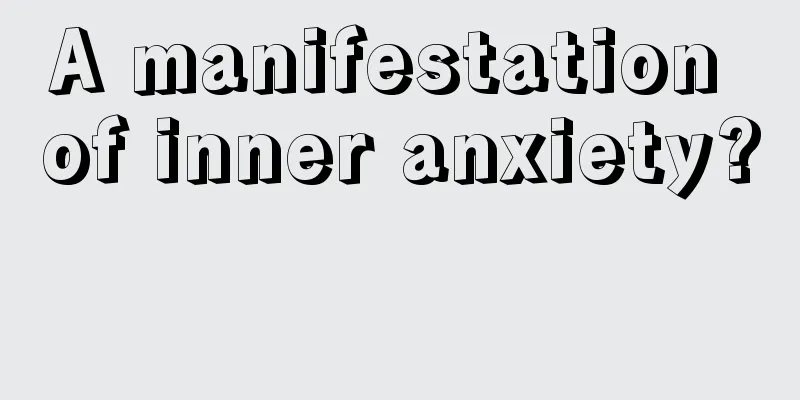A manifestation of inner anxiety?

|
When it comes to mental health, the first thing that comes to mind is depression. Most people tend to ignore anxiety. In fact, 80 percent of patients with depression also suffer from anxiety. Now that work pressure is high, more and more people are suffering from anxiety. Anxiety may not seem to be a serious illness, but it is actually very harmful to the human body. Anxiety must be treated in a timely manner. What are the manifestations of inner anxiety? Anxiety is a response to threats and psychological stress, and is an experience that everyone has had. Normal anxiety is an important survival instinct, characterized by a source of fear. For example, when a person is facing danger, anxiety can cause a fight or flight response, and the body also undergoes a series of physiological changes, such as increased blood supply to the heart and muscles. If anxiety occurs at inappropriate times and occurs frequently, or if it is intense and lasts for a long time, interfering with normal life, it is considered a disease state. Anxiety disorders can be divided into two forms: chronic and acute. Chronic anxiety is also called generalized anxiety, and acute attacks are also called panic disorder. The main manifestations are nervousness and uneasiness, and this uneasiness is disproportionate to the individual's situation. There will be sweating, dizziness, suffocation, tachycardia, trembling or avoidance of certain situations. The diagnosis of anxiety disorders has specific criteria and generally requires assessment through an anxiety rating scale. Given the low rate of visits to psychiatric departments, you can also first check yourself based on the 10 common manifestations of anxiety disorder, and seek help from a professional doctor in a timely manner if you find any abnormalities. The first manifestation of anxiety disorder is to have unwarranted worries about things in life. If this lasts for more than 6 months, you should consider whether you have anxiety disorder. The second manifestation is inexplicable fear, often causing restlessness and rubbing hands and feet, but the fear has no specific object; The third type is physical tension, with frowning brows, clenching teeth and clenching fists; The fourth type has insecurity, self-doubt, and overestimation of difficulties; The fifth is the fear that you will lose control, lose control of your emotions, get angry all the time, and feel that the world is against you; The sixth is the repeated confession that she has never given birth to A-Mao but is like Xianglin Sao. Anxiety disorders can also have physical symptoms. The seventh manifestation of anxiety is physical discomfort, feeling anxious, chest tightness, shortness of breath, rapid heartbeat, and fatigue; The eighth symptom is sleep disorders and frequent nightmares; The ninth manifestation is being overly alert, being alert to the slightest movement around; The tenth symptom is being easily irritated, getting angry over trivial matters, having difficulty concentrating, being overly sensitive to sound and light, and also experiencing memory loss. The cause of anxiety disorders is not very clear. It is now believed that genetics, traumatic events, stress, physical and psychological factors are all related to the formation of anxiety disorders. Many people who are prone to anxiety disorders are workaholics, and their risk is three times higher than those who can better balance life and work. Studies have also found that people who sit for long periods of time are more likely to develop anxiety disorders. Anxiety disorder not only affects the psychological and living conditions, but also has many negative impacts on health. First, anxiety is a risk factor for cardiovascular disease and is significantly associated with an increased risk of cardiovascular mortality, including stroke, coronary heart disease, and heart failure. Anxiety disorders also increase the risk of Alzheimer's disease and are associated with skin diseases. A study conducted in Northern Europe found that anxiety can worsen wheezing, breathing difficulties, and nighttime symptoms. Studies in the United States have confirmed that anxiety can affect the success rate of pregnancy. Research in Iceland found that anxiety can accelerate cellular aging. Anxiety disorders are currently treated with medication and psycho-behavioral therapy. The main medication is alprazolam, a benzodiazepine, and is sometimes used in combination with antidepressants. Studies have shown that exercise |
<<: Symptoms of catching a cold while sleeping at night
>>: How to relieve inner anxiety?
Recommend
How often should cervical cancer screening be done
Cervical cancer screening is generally recommende...
How about gynecological ultrasound treatment
The special structure of the female reproductive ...
What is piercing
When it comes to this special treatment method ca...
Is primary liver cancer contagious? Introduction to common knowledge about primary liver cancer
The clinical manifestations of primary liver canc...
How should I treat bloating and frequent smelly farts?
If some friends eat too much coarse grains in the...
Is the scent of lily harmful to the body?
In daily life, many people like to add some color...
Can FH gene-deficient renal cancer be cured?
The treatment of FH gene-deficient renal cancer r...
Psychological nursing diagnosis after endometrial cancer surgery
It is not only about professional treatment, but ...
Symptoms of advanced cardia cancer
If cardia cancer is not treated in time, it will ...
Plantar tendinitis
Some people are prone to plantar tendinitis, whic...
Can laryngeal cancer be contagious to others?
Laryngeal cancer is a malignant tumor and is not ...
How to clean oil stains on clothes
For female friends, the most annoying thing may b...
Do you feel headache and nausea from using air conditioning?
In the hot summer, many people can’t imagine how ...
Girls who like to drink water with a straw are more likely to develop wrinkles
In the eyes of women, wrinkles are the end of bea...
What to do if thyroid cancer causes vision loss
Thyroid cancer is a malignant tumor originating f...









